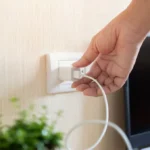For many people, slipping on a soft pair of socks before bedtime is just a simple comfort routine. But here’s the surprising part: sleeping with socks can actually bring real health and sleep benefits that go beyond warmth. While this habit isn’t for everyone, understanding when it helps—and when it doesn’t—can make a big difference in your nightly rest.
Why Sleeping With Socks Can Be a Game-Changer
– Fall Asleep Faster
Warm feet improve circulation by widening blood vessels, which lowers core body temperature. This signals to the brain that it’s time to rest, helping you drift off more quickly.
– Better Sleep Quality
Maintaining a steady body temperature throughout the night reduces waking up and encourages deeper, more refreshing sleep.
– No More Cold Feet
Perfect for anyone who struggles with poor circulation or chilly extremities, socks keep your feet consistently warm.
– Healthier Skin
Moisturizing your feet before bed and wearing socks over them helps seal in hydration, preventing dryness and cracked heels.
– Relief From Hot Flashes or Anxiety
By keeping body temperature stable, socks can help reduce night sweats, hormonal fluctuations, and even nighttime restlessness.
When You Should Skip Sleeping in Socks
Although generally safe, sleeping in socks isn’t recommended for everyone. Here’s who should be careful:
1. People With Diabetes or Poor Circulation
Tight socks can restrict blood flow, and those with neuropathy may not feel the damage.
Tip: Choose non-binding diabetic socks specifically designed for safe overnight use.
2. Those Who Overheat or Have Night Sweats
Extra warmth can raise body temperature too much, leading to sweating and disrupted sleep.
Tip: Try a warm foot bath before bed instead of keeping socks on all night.
3. People Prone to Fungal Infections
Moisture and warmth inside socks can encourage fungal growth.
Tip: Wear only clean, breathable cotton or moisture-wicking socks and wash feet daily.
4. Infants and Small Children
Loose socks pose choking hazards for babies, and toddlers may overheat or feel restricted.
Tip: Opt for footed pajamas or sleep sacks instead.
5. Those With Sensitive Skin or Allergies
Synthetic fabrics may cause irritation or rashes.
Tip: Stick to organic cotton or hypoallergenic socks.
6. Anyone Wearing Compression Socks Improperly
Compression socks should only be worn overnight with a doctor’s approval.
Tip: Use regular loose-fitting sleep socks for warmth instead.
Bottom Line
Sleeping in socks can improve sleep quality, circulation, and comfort—but only when done correctly. Always:
– Wear breathable, clean socks
– Avoid synthetic or tight-fitting materials
– Take special precautions if you have skin conditions, fungal issues, or circulation problems
When in doubt, check with a healthcare professional to ensure this habit is safe for you. For many, the simple act of wearing socks at night could be the easiest way to enjoy deeper, warmer, and healthier sleep.
















